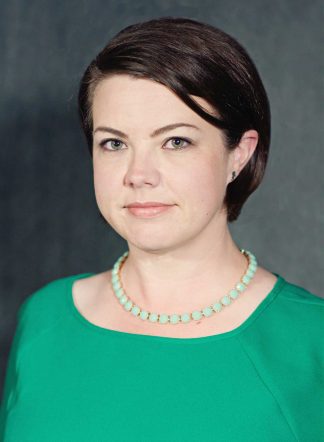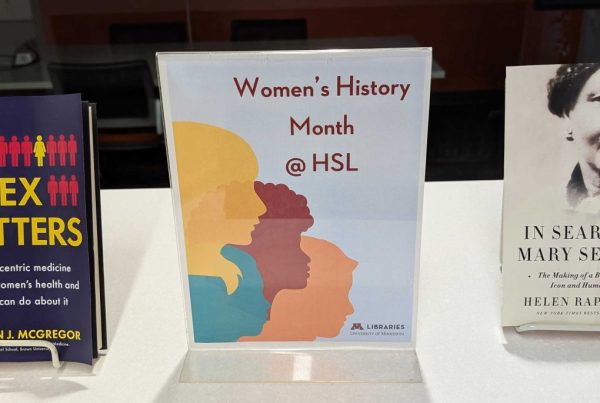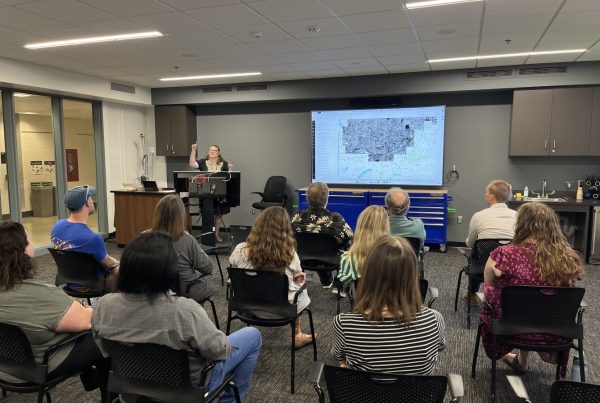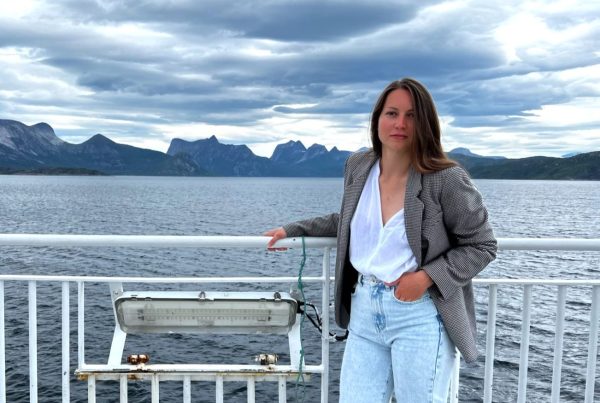By Jon Jeffryes
As far back as she remembers, Emily Riha has drawn inspiration from the ideal of making the world a more just and equitable place.
“I’ll see a news story and say, ‘Well that’s not fair.’” Riha explains, “I’ve actually been like that since I was a child.”
Riha finds that ideal echoed in the mission of the University of Minnesota and exemplified in her work as the Copyright Permissions Coordinator at the University of Minnesota Libraries.
“I think that the University really strives to provide fair and equal access to education,” Riha says. “The Libraries provide fair and equal access to information — no matter who is seeking it out.”
A broker on behalf of students and researchers
As Copyright Permissions Coordinator, Riha acts as a broker on behalf of students and researchers at the University of Minnesota. She obtains use rights to copyrighted materials so that they can be used for class readings and in publications. She strives to advocate for the University of Minnesota and obtain the best possible price.
Riha’s job directly impacts equity in education and access to information.
Riha partners with others in the Libraries, the University Bookstores, and Office of Information Technology in creating Digital Course Packs. Digital Course Packs utilize pre-existing library subscriptions to stop students from re-purchasing content for courses that they already have access to through the Libraries’ subscriptions.
If the Libraries doesn’t have subscription access, Riha steps in to contact the rights holders to license the material for sale through the bookstore. This work has greatly reduced student costs — Riha worked with one student and found that 85 percent of the readings he was set to buy could be accessed via the Libraries!
A review of Riha’s publications and presentations shows a focus on applying innovative solutions to reduce the cost of course materials and ensure that required course readings are as affordable and easy to access as possible. She highly values the opportunity to contribute to the effort to reduce college costs.
Her job requires a bit of detective work
Riha’s job requires a bit of detective work. She must find the current owner of a document’s copyright and contact them directly to get permission for reuse or to negotiate a price for licensed rights. Some people are easy to find. Riha’s favorite copyright request story includes contacting Supreme Court Justice Ruth Bader Ginsburg and Chief Justice John Roberts. A copy of Justice Ginsburg’s response hangs in her office.
But identifying and locating other copyright holders sometimes requires deeper digging. For these cases Riha draws on her expertise with information seeking to aid her investigations into determining the identity and whereabouts of copyright holders. The process can be long and tangled. If original copyright holders have died, Riha must use creativity and persistence to find out to whom the rights were transferred.
“I sometimes end up searching the white pages and if there’s multiple people listed, I’ll make multiple phone calls,” Riha recalls. “And say, ‘Are you the person that owns this?’”
Along with expertise in locating information, Riha draws on her knowledge of copyright. She’s currently finishing the CopyrightX program through Harvard University to further enhance her command of the subject.
Riha’s goal: Get the fairest, best possible cost
Outside of work Riha enjoys photography and DIY projects. She also enjoys reading cookbooks and recipes and — occasionally — cooking the recipes. She’s also recently started a tradition with friends to better appreciate the Twin Cities restaurant scene by voting on which new restaurants to explore with a monthly dinner.
Over the next year, Riha is planning to help expand the reach of the Digital Course Packs. She hopes to partner with subject librarians to identify and reach out to classes that might benefit from the service.
This project will allow Riha to engage in her favorite aspect of the job: “Helping people get the fairest, best possible cost for their material.”





